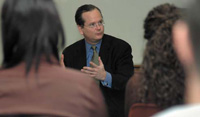 In 1888 Eastman Kodak faced a dilemma: getting
permission before taking a person’s picture. The courts ruled that permission
wasn’t necessary.
In 1888 Eastman Kodak faced a dilemma: getting
permission before taking a person’s picture. The courts ruled that permission
wasn’t necessary.
“Today we face a similar Kodak moment,” Lawrence Lessig, a Stanford University law professor and authority on information technology as it relates to culture, said at UT Arlington in November. “We have to find out what makes sense today on the Internet. Policy makers in Washington will soon have to make some decisions as to how copyright laws affect the World Wide Web.”
Lessig was the keynote speaker at UT Arlington’s fifth annual Technology Fair in the E.H. Hereford University Center. The event showcased instructional, workplace and research technology and hosted more than 75 vendors and campus-based technology projects.
He cited Google Print as an example of how a search site can find almost any book, yet needs no permission to locate it. “In September 2005 the American Association of Publishers filed a lawsuit against Google Print because Google wanted to digitalize 20 million books and make them available online. Google’s answer was that if permission is required, then Google Print is not possible. Right now, Google is still an open index and the future remains to be determined.”
Lessig, founder of the Stanford Law School’s Center for Internet and Society, told the story of J.D. Lasica, author of Darknet: Hollywood’s War Against the Digital Generation.
“Here is a man who actually asked permission to use cartoon characters such as Superman, Snow White and Mickey Mouse in his home movies. He was denied by Universal, Warner Brothers, Disney and so on. He just wanted to include their pictures as interludes between home movies of children. They all said no. Yet on the Internet rarely does anyone ask permission.
“The reason the law is ignored is because it can be ignored. Soon it won’t be possible to ignore.”
Lessig has won numerous awards, including the Free Software Foundation’s Freedom Award, and was named one of Scientific American’s Top 50 Visionaries for arguing against interpretations of copyright that could stifle innovation and discourse online.
“I’m not anti-copyright. Copyright is essential in the digital age in order
for artists to create,” he said. “We just need to recognize the difference
between copyright in an analog world and in a digital world.”
— Jim Patterson
| Archives
| Alumni Association |
Giving to UTA | UTA
Home Copyright © 2006 UTA Magazine. All rights reserved. |
